

"The Ghosts of Economics Past" by J. Bradford DeLong. Exit from comment view mode.
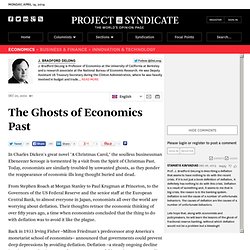
"The New New Thing in Economics" by J. Bradford DeLong. Exit from comment view mode.
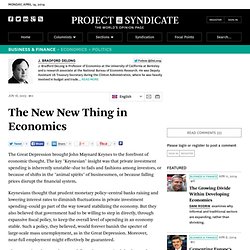
Click to hide this space The Great Depression brought John Maynard Keynes to the forefront of economic thought. The key "Keynesian" insight was that private investment spending is inherently unstable--due to fads and fashions among investors, or because of shifts in the "animal spirits" of businessmen, or because falling prices disrupt the financial system. Keynesians thought that prudent monetary policy--central banks raising and lowering interest rates to diminish fluctuations in private investment spending--could go part of the way toward stabilizing the economy.
But they also believed that government had to be willing to step in directly, through expansive fiscal policy, to keep the overall level of spending in an economy stable. General Theory of Employment, Interest, and Money, by Keynes. The early pioneers of economic thinking may have hit upon their maxims of practical wisdom without having had much cognisance of the underlying theoretical grounds.
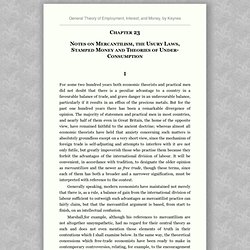
Let us, therefore, examine briefly the reasons they gave as well as what they recommended. This is made easy by reference to Professor Heckscher's great work on Mercantilism, in which the essential characteristics of economic thought over a period of two centuries are made available for the first time to the general economic reader. The quotations which follow are mainly taken from his pages. (1) Mercantilists' thought never supposed that there was a self-adjusting tendency by which the rate of interest would be established at the appropriate level. Glyn Davies. Denmark and the Aftermath of War Immediately following the Germany surrender at Lüneburg Heath the Royal Dragoons, along with a few other British regiments, took part in the liberation of Denmark.
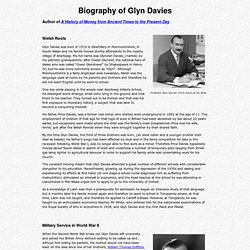
Among the Germans taken prisoner was Lieutenant Otto Wendt von Radowitz, an aristocrat, and Glyn Davies was given the task of escorting him home to Germany on his release. (According to the orders given to Glyn Davies on 22 August 1945, the British Consulate in Copenhagen wanted von Radowitz to search for "some English documents of importance, believed to be in the safe at Falkenberg Castle"). Von Radowitz's mother showed her gratitude at seeing her son again by offering Davies a copy of Mein Kampf, signed by Hitler himself, but the offer was tactfully declined. A more lasting result of his stay in Denmark was the meeting with the young Danish woman, Anna Margrethe, (or Grethe) who, in 1947, was to become his wife.
Academic Career and Interests. The Cancer Stage of Capitalism. The Cancer Stage Of Capitalism: Our social immune system is being overwhelmed by growing out-of-control money market cancer By John McMurtry [John McMurtry, professor of philosophy at the University of Guelph, uses the metaphor of modern capitalism as a cancer to describe the recent uncontrolled spread of global capitalism.
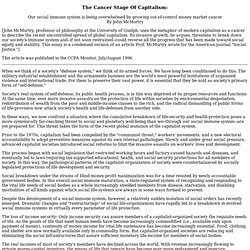
Its invasive growth, he argues, threatens to break down our society's immune system and--if not soon restrained--could reverse all the progress that has been made toward social equity and stability. This essay is a condensed version of an article Prof. The New York Times > Business > Economic Scene: The Theory That Self-Interest Is the Sole Motivator Is Self-Fulfilling. Published: February 17, 2005 NEW YORKER cartoon depicts a well-heeled, elderly gentleman taking his grandson for a walk in the woods.
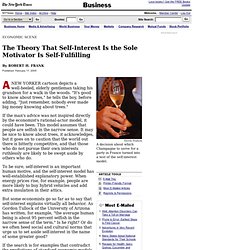
"It's good to know about trees," he tells the boy, before adding, "Just remember, nobody ever made big money knowing about trees. " If the man's advice was not inspired directly by the economist's rational-actor model, it could have been. This model assumes that people are selfish in the narrow sense. It may be nice to know about trees, it acknowledges, but it goes on to caution that the world out there is bitterly competitive, and that those who do not pursue their own interests ruthlessly are likely to be swept aside by others who do. To be sure, self-interest is an important human motive, and the self-interest model has well-established explanatory power. But some economists go so far as to say that self-interest explains virtually all behavior.
He just happened to have an excellent one on sale for only 18 euros. Robert H. An Error Occurred Setting Your User Cookie. Participatory economics. Albert and Hahnel stress that parecon is only meant to address an alternative economic theory and must be accompanied by equally important alternative visions in the fields of politics, culture and kinship.
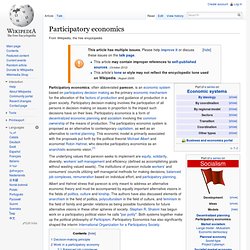
The authors have also discussed elements of anarchism in the field of politics, polyculturalism in the field of culture, and feminism in the field of family and gender relations as being possible foundations for future alternative visions in these other spheres of society. Stephen R. Shalom has begun work on a participatory political vision he calls "par polity". Both systems together make up the political philosophy of Participism. Participatory Economics has also significantly shaped the interim International Organization for a Participatory Society. Decision-making principle[edit] The Malthusian physiognomy of Nazi economics. Front Page. Krugman contra Hayek - Jonathan M. Finegold Catalan. The current recession has brought back discussion on the merits of countercyclical fiscal and monetary policy.
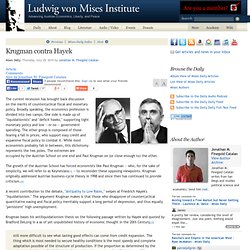
Broadly speaking, the economics profession is divided into two camps. One side is made up of "liquidationists" and "deficit hawks," supporting tight monetary policy and low — or no — government spending. The other group is composed of those fearing a fall in prices, who support easy credit and expansive fiscal policy to combat it. While most economists probably fall in between, this dichotomy represents the two poles. J. S. Mill on Method. How to Understand the Disaster by Robert M. Solow.
A Failure of Capitalism: The Crisis of ‘08 and the Descent into Depression by Richard A.
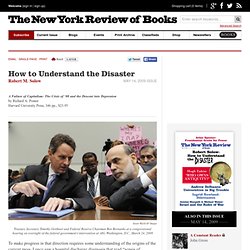
Posner Harvard University Press, 346 pp., $23.95. How Competition Goes Wrong - McMURTRY - 2008 - Journal of Applied Philosophy. GARRISON'S TIME AND MONEY: THE MACROECONOMICS OF CAPITAL STRUCTURE. Massachusetts Institute of Technology 150th anniversary. Watch videos of this symposium This symposium celebrated the role of MIT's faculty and students in advancing the fields of economics and finance, in putting the latest developments into practice, and in contributing to the design of public policy.
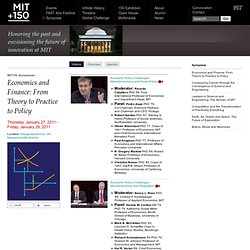
A series of six panels, which included Nobel laureates, policy makers, and academic and industry experts, addressed three broad questions: ECON 3700 HISTORY OF ECONOMIC THOUGHT. A History of Wealth and Poverty. Videos from the World's Best Conferences and Events. 10 Lesser Known Economic Issues. Politics While not an economist in the traditional sense, I am very interested in the study of economics. While not everyone shares this level of interest, I believe people should have an understanding of economics as the field is so important to understanding the world that we live in.
Though this list contains ideas that are controversial, it is not intended to promote anger or controversy. Rather, these entries were chosen to shed some light on lesser known, yet important economic issues facing our world, and give readers something to ponder. Why do some countries’ economies grow faster?